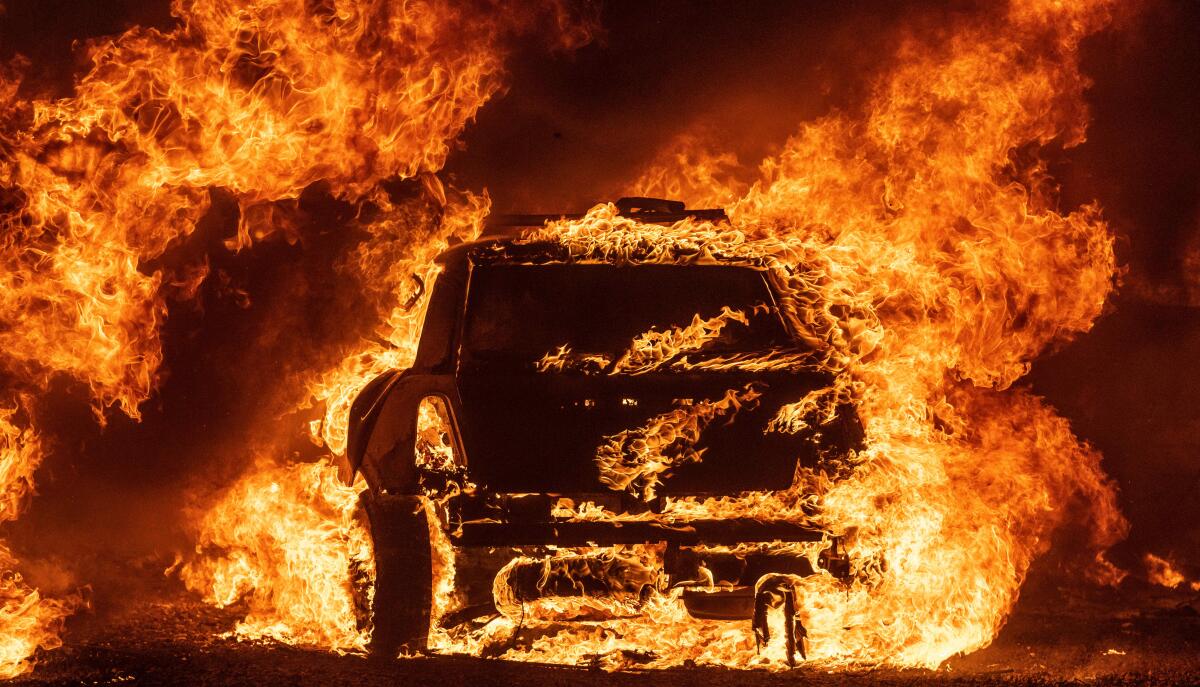Second effort to boost wildfire funding falls flat in the California Legislature

- Share via
SACRAMENTO — An eleventh-hour push in the California Legislature to direct $500 million to wildfire response and prevention fell flat Monday, marking the second late attempt to boost fire funding that failed in the last week.
The efforts to secure more money for wildfires fizzled out as blazes burned more than a million acres across the state during the frenetic final days of the legislative year.
Arguing that California needs to do more to prevent fires, Democrats in the Senate came up with the plan to spend $500 million dollars on fires after a bill to generate $3 billion for wildfire and climate projects through the extension of a fee on electricity bills failed to gain traction last week.
But even the scaled-back spending plan was fraught with legislative hurdles that proved too difficult to overcome and the plan was scuttled before it was officially introduced. Senate President Pro Tem Toni Atkins’ office confirmed that the proposal was dead late Monday.
The late nature of the proposal would have required Gov. Gavin Newsom to submit a statement to the Legislature saying the bill was necessary to address a state of emergency and waive a state law that prevents lawmakers from amending legislation in the final hours before the Legislature adjourns for the year.
Action from Newsom also hinged on the ability of the Senate and Assembly to strike a deal to support the plan, which never materialized.
The push came after lawmakers introduced AB 1659 one week ago to add 10 years to an existing utility fee for bonds to pay for wildfire and climate projects.
AB 1659 repeated a financial model lawmakers had created last year when they extended the fee for 15 years to 2035 to generate bonds used to pay for wildfire damages caused by utility equipment. The 2019 law made it easier for utilities to avoid being on the hook for wildfire damages through a new safety certification process and created a $21-billion fund as an additional shield against losses from blazes linked to their equipment.
The attempt to tap customers for another decade of fees didn’t sit well with ratepayers, lawmakers and some of the state’s most powerful business groups. The California Chamber of Commerce, the California Farm Bureau Federation, the Western States Petroleum Assn., Pacific Gas & Electric, San Diego Gas & Electric and the Utility Reform Network were among the opponents of the bill.
By Saturday, lawmakers had dropped the extension on ratepayers and instead mapped out a plan to come up with $500 million from California’s cap-and-trade program — which requires companies to buy permits to release greenhouse gas emissions — as well as state general fund revenues and a 2018 bond measure.
“Our state is on fire,” said Sen. Ben Allen (D-Santa Monica) as he and other lawmakers attempted to earn support for the proposal. “This is a vital and urgent need and I certainly hope we can get it done.”
The money would have gone to a variety of efforts aimed at addressing wildfires and climate change, including cooling centers, backup solar power, emergency shelters, warning and detection systems, hardening projects, forest health and workforce training.
More to Read
Sign up for Essential California
The most important California stories and recommendations in your inbox every morning.
You may occasionally receive promotional content from the Los Angeles Times.














